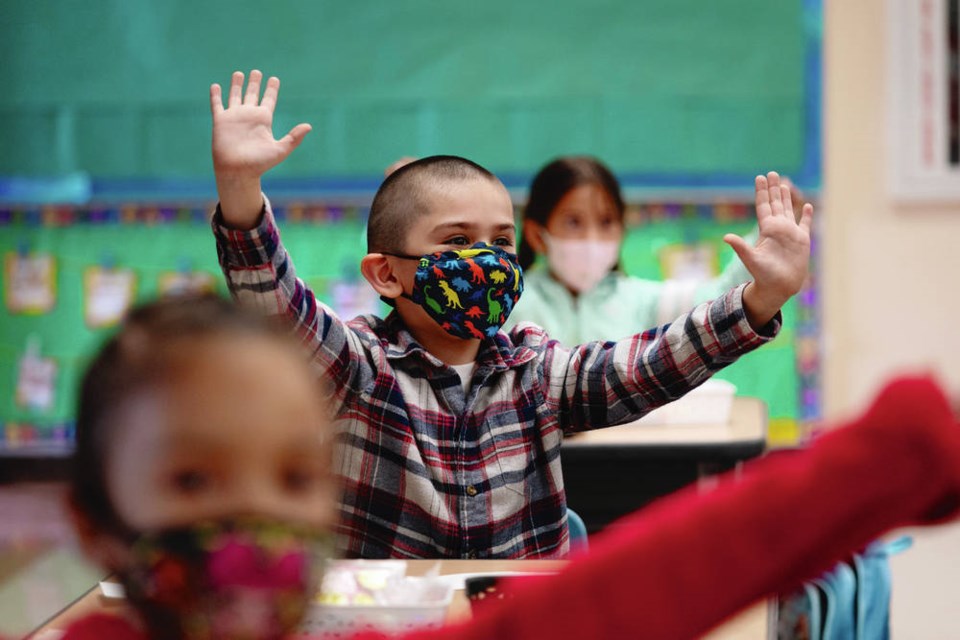This week’s column was (again) to be about the inadequacy of letter grades as measures of successful learning or, for that matter, predictions about anything relating to a child’s progress in school or in later life.
Oh no, you say — not another polemic about the least reliable gauge of learning, which is still substantially relied upon by parents as an indicator of their child’s educational progress and prospects.
It is an irony and a problem that even though a letter grade on a report card provides no educationally useful information, it is impossible to deny that letter grades are still being used as a significant marker of a child’s future prospects — the ability to get into college, qualify for scholarships and so on.
Then, just as I was preparing to escalate into yet another full-on 750-word rant about the many shortcomings of measuring or predicting anything worth knowing with a single letter grade (a doctor’s report on the state of one’s physical or mental health, for example), a new study appeared, a comprehensive 20-year examination of 800 children from kindergarten through their mid-20s published in the American Journal of Public Health.
This longitudinal study establishes a link not between faux measurements of academic and cognitive progress, but between the development of a child’s social and emotional skills in kindergarten and success in early adulthood.
Researchers found, among other things, that children who were helpful and learned to share in kindergarten were more likely to have graduated from college and have a full-time job at age 25.
Further, children who had problems resolving conflicts, sharing, co-operating and listening as kindergartners were less likely to have finished high school and college, and more likely to have substance-abuse problems and run-ins with the law.
The findings are “huge” when it comes to thinking about how social and emotional health, even more than cognitive progress, affects a person’s overall health and wellbeing in later life.
As Kristin Schubert, program director for the Robert Wood Johnson Foundation, which funded the research, commented: “It’s like a paradigm shift around what it means to be mentally well at an early age and how that dictates how life goes for you later on.”
To conduct the study, researchers from Penn State University and Duke University looked at data from 1991 teacher evaluations of kindergartners’ social competency skills.
For every one-point increase in a child’s social-competency score in kindergarten, the child was, 20 or so years later, twice as likely to obtain a college degree, and 46% more likely to have a full-time job by age 25.
The implications of the study’s findings are far-reaching, said Schubert. “First, there’s a message to educators that finding ways to develop social and emotional learning can be just as important as cognitive skills.”
Damon Jones of Penn State University, the lead researcher for the study, said researchers were “surprised but not completely surprised” by the findings.
Jones said he and his fellow researchers knew the importance of social and emotional competency in a child’s development, but didn’t quite expect to find as strong a correlation between those skills and a child’s long-term well-being, even with other variables such as a family’s socioeconomic status and the child’s academic ability factored out.
The researchers wrote that success in school involves social-emotional as well as cognitive skills, because social interactions, attention and self-control affect readiness for learning.
But can those social and emotional skills be taught and learned? Yes, says Canadian educator, social entrepreneur, child advocate and parenting expert Mary Gordon.
Gordon is the founder and president of both Roots of Empathy and Seeds of Empathy, non-profit evidence-based programs dedicated to promoting emotional literacy and empathy among children.
The program, endorsed by the B.C. Ministry of Education, consists of 27 weekly classes with a Roots of Empathy instructor who focuses on the development of “other-centred” social skills throughout the school year. It’s now found in 81% of B.C.’s school districts, across all five health regions.
All well and good, you say, but doesn’t getting “back to the basics” of K-12 education involve using traditional letter grades as place markers in learning? Without that, how can we represent a student’s progress?
Well, stay tuned, because next week’s column will outline six non-letter-grade assessment methodologies that are gaining increasing acceptance as more accurate in assessing progress in both learning and personal growth in students.
Geoff Johnson is a former superintendent of schools.
- - -
To comment on this article, write a letter to the editor: [email protected]



